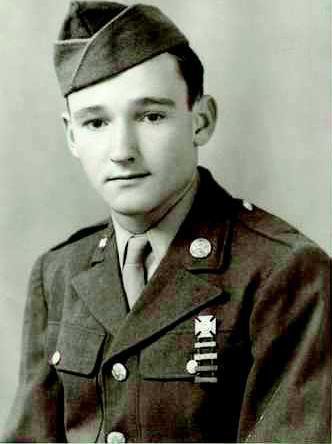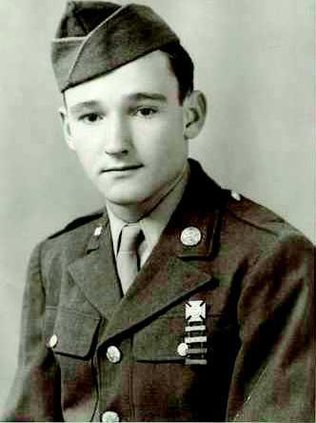Jack and Don Matthews each served their country, and will be memorialized on the Golden Belt Veterans Memorial at Golden Belt Memorial Park. Here is part one of a four part series that tells the stories of their service and beyond.
When members at Great Bend’s American Legion learned the Tribune had donated $1,000 to the Golden Belt Veterans Memorial in July, they contacted Barton County Administrator Richard Boeckman and nominated two brothers whose service to the country spanned two wars.
Jack Matthews entered the military after he graduated from Great Bend High School in 1942, according to his younger brother, Donald. He served with the 101st Airborne, “Screaming Eagles,” which was spotlighted in the 2001 11-part mini-series Band of Brothers. He was present during D-Day and through the Battle of the Bulge. According to his Feb. 15, 2013 obituary in The Tribune, he was the recipient of the Bronze Star and Purple Heart with oak leaf cluster.
His service inspired his younger brother, Donald Matthews, to enter the military in 1949, and he was serving during the beginning of the Cold War when the Korean Conflict broke out. Matthews was one of the men who guarded the Alaskan border, and witnessed planes leaving Russia on their way to North Korea.
Both returned to Barton County when their tours of duty were complete. The Tribune recently met with Donald Matthews, now 85, still living on his own in Great Bend. He is the last of six Matthews brothers, and in May attended an Honor Flight to Washington D.C., accompanied by a guardian, where he saw the Korean War memorial. After Jack died, his daughters gave him a copy of their father’s memoirs of growing up and his time serving in the war. They’ve agreed to share his experience with The Tribune. This is part one of a four part series that includes Our more sensitive readers should be warned, this account is somewhat graphic in nature.
Guardian angel protects wounded soldier
“On Aug. 28, 1944, during an attack on German positions near Brest, France, I laid wounded through the hip in a shallow depression in a cabbage patch between two hedgerows. I emptied half a clip of ammo from my submachine gun into the next hedgerow and then flattened out as best I could. I was the lead scout and only one other man came out behind me. His name was Dahlberg. I had reached some distance into the field before going down. Dahlberg was shot shortly after coming out of the sunken road where we started. As he hollered for medics, they shot him again and he screamed and screamed.
I figured they would shoot me again but I think I got below their line of sight and the machine gun to my left and in front couldn’t traverse down enough to hit me again.
The attack stopped and I and Dahlberg were trapped between the lines. I figured on playing dead till dark then try to crawl back if they didn’t shoot me again. Although I doubt if it was near noon yet. I still heard lots of firing from both sides. The German machine guns were seemingly twice as fast as ours and there was no mistaking them.
Shortly later I heard a mortar shell coming in and it landed behind me and exploded with a little dirt falling on me and then another round came whistling in and landed in front of me and exploded and sent more dirt on me but no shrapnel. I knew the next one would be bracketed in on me but I didn’t and couldn’t run. It landed real close to me and thudded into the soft earth next to me but miraculously didn’t explode! At that instant I believed in guardian angels. And I swore if I got out of this alive I would attend church every Sunday from now on.
While laying there for what seemed like hours I heaved up a little bit of green bile, foul tasting stuff probably from fear, although the pain had subsided a lot. I heard metallic clicks I took to be the bolt actions on the German rifles, and Dahlberg had stopped moaning near so much. To digress, the medics wore red cross arm bands and a red cross was painted on their steel helmets they were not armed but I do not fault them to this day for not coming out for us, especially Dahlberg. I guarantee they would have been shot.
The Sgt. (from Abilene, Texas) had yelled out to me early on but I was afraid if I answered him I would be shot again. I don’t know how much time elapsed but firing quieted down a lot in our sector and the Sgt. hollered again and said to see if I was able to crawl back.
It took all my willpower to answer him and fully expected another bullet when I did. He said to try it and they would cover me.
Earlier in the attack that morning, I was second scout and had followed the first scout, Willis Babcock (a big, tall, gangly kid from New England). I covered him as we progressed and once I stopped beside a small shock of feed in a field and a bullet knocked the top off the shock I was kneeling by--the next bullet splatted into the ground a few inches in front of the knee I was kneeling on. When we reached the sunken road where the last part of our attack took place, the Sgt. split me and Babcock up and I became first scout for part of our squad.
Willis took part of the squad on further down the sunken road.
When I rejoined the 2nd Division in December, 1944, only one man from our squad was still there (Belgium--in the Bulge). He was Keaton. I asked him what happened to Babcock, and he said he was killed by three machine bullets in the chest.
In 1990, I bought a book about the 2nd Division and it showed Babcock was killed on Aug. 30. I was shot on the 28th and assumed Willis was killed that day. I will never know for sure.
Anyway, I turned my body around and started crawling real slowly back, fully expecting another bullet. I left my submachine gun and ammo bag with extra clips hoping that would help. When I got to Dahlberg, who was quiet now, Sarge said to help him back too. I asked him if he could crawl, and he said he couldn’t see. He was in shock I think, and had lost so much blood was why he couldn’t see. He was holding his fist in his lower abdomen and the second bullet had gone down through his body but he was alive. I took a hold of his collar and figured when I started dragging him we would both be finished off.
When we got to the sunken road, the Sgt. and two medics pulled us on down into relative safety. They took off with Dahlberg on a stretcher and the Sgt. told me the metallic clicks I heard was them digging foxholes and he figured the Germans immediately in front of us had pulled back a ways. But a German machine gun was still covering one opening the medics had to carry I and Dahlberg past.
They laid the stretcher down and waited for the machine gun to quit firing then picked us up and ran across the opening real fast.
They got us back far enough they could load us on the side of a jeep by strapping the stretcher to it.”
“I was taken to a field hospital-- tents and dirt floors, somewhere in France. Two Corpsmen got me ready. They gave me a great big shot of penicillin. It was the first I had heard of it. They took my personal possessions and when I told them I had a hand grenade in each two front fatigue jacket pockets they just about panicked. I did too but I sure meant to leave them with the Sgt. but forgot all about them. I told them they were safe if they didn’t pull the pins. Then they would have five seconds after they are thrown and the handles fly off.”
Brother to Brother
Part 1





